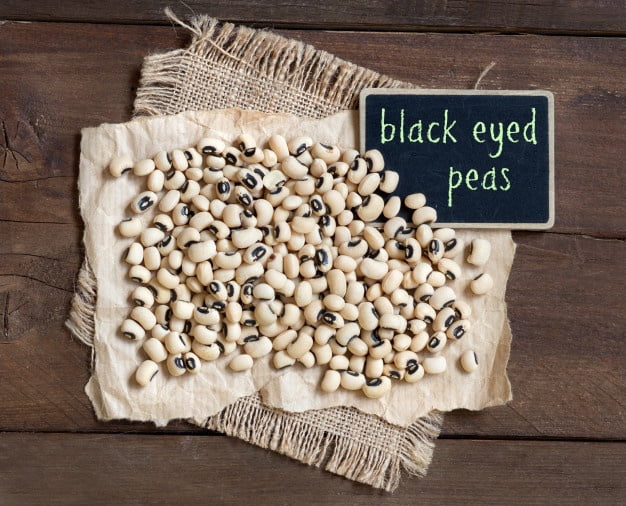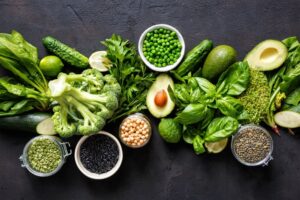Black-eyed peas also called Cowpeas, are extremely healthy and nutritious.
Black-eyed pea a delicious legume is commonly cultivated in Nigeria and other parts of West Africa.
It is scientifically called Vigna unguiculata and is a staple food in most Nigerian homes including mine.
Black-eyed peas have a high protein content that is equivalent to the amount of protein found in certain types of meat. They provide fiber, iron, potassium, and magnesium while containing little or no fat.
They are two varieties of cowpeas, the white and brown cowpea. The brown cowpea variety being slightly higher in its protein content than the white variety.
Nutrition Facts of Cowpeas
Black-eyed peas contain several important micronutrients, including folate, iron, copper, and thiamine.
One cup (171 grams) of cooked cowpeas contains the following nutrients [1].
- Calories: 198kcal
- Water: 120 grams (g)
- Fat: 0.9 g
- Protein: 13 g
- Carbohydrate: 35.5 g
- Fiber: 11 g
- Folate: 89% of the Daily value
- Iron: 53% of the DV
- Zinc: 20% of the DV
- Copper: 55% of the DV
- Potassium: 13% of the DV
- Phosphorus: 38% of the DV
- Magnesium: 23% of the DV
- Selenium: 7% of the DV
- Thiamine: 25% of the DV
- Riboflavin: 7% of the DV
- Vitamin B6: 13% of the DV
Note: The daily value (DV) is based on a 2000 calorie diet.
Health Benefits of Cowpeas
The possible health benefits of eating black-eyed peas are:
1. Rich in nutrients
Black-eyed peas are high in plant protein, complex carbs and fiber.
They are a powerhouse of antioxidants, B- vitamins, copper, folate, iron, magnesium, manganese, phosphorous, potassium, and zinc.
2. Low in Fat
Most beans including black-eyed peas are about 2 to 3 percent fat and contain no cholesterol unless they’re processed or prepared with other ingredients, such as lard. Making them a healthful food for anyone trying to stay fit and healthy.
3. Protects heart health
Cowpeas are a rich source of B-vitamins, soluble, and insoluble fiber which help protect your heart and keep you healthy.
Studies have shown that regular intake of legumes was linked to lower total and low-density lipoproteins (LDL) cholesterol and other risk factors for heart disease[2].
One study also showed a 38% lower risk of a non-fatal heart attack when a cup of cooked beans was consumed daily.[3]
Related: 6 Surprising Health Benefits of Pigeon peas.
4. Regulates blood glucose
Black-eyed peas are high in dietary fiber, which are complex carbohydrates that digest slowly and contribute to feelings of fullness.
As a result, consuming beans have shown increased feelings of satiety and have helped regulate plasma glucose and insulin levels after meals. [4]
5. Prevents cancer
Cowpeas are rich in phenolic compounds which are antioxidants that help protect the body from toxins [5].
One study reported that the consumption of phenolic antioxidants rich foods like cowpeas may protect against chronic diseases like cancer, diabetes, and cardiovascular disease [6].
Another study showed that dietary fiber in beans may play a role in reducing the risk of recurrent colorectal cancer [7].
6. Promotes weight loss
Due to the high content of protein and soluble fiber in cowpeas, consuming them will lead to long-term satiety, thereby boosting weight loss.
A review of 21 trials concluded that including dietary pulses, such as black-eyed peas, in your diet may be an effective weight-loss strategy and may help reduce body fat percentage [8].
Related: 50 African foods to help you lose weight
7. Great in pregnancy
One cup of boiled black-eyed peas contains 89% of the daily value of folate making a rich source of folate for pregnant mothers.
Folic acid, the synthetic version of folate is required in pregnancy to prevent neural tube defects in the newborn.
Therefore, it is advised that expectant mothers add beans to their diets.
Related: Best Nigerian foods to eat during pregnancy and what to avoid
8. Prevents anemia
Iron is essential for the formation of red blood cells in the body and cowpeas are a rich source of iron.
9. Promotes digestive regularity
Black-eyed peas are filled with fiber, which promotes easy digestion and prevents constipation.
Related: African foods high in dietary fiber.
10. Gluten-free alternative
This delicious bean and other beans are highly recommended for people with celiac disease because they are gluten-free.
Celiac disease is found in people allergic to gluten, a natural protein found in wheat, barley, rye, and sometimes oat.
Culinary Use

Black-eyed peas are highly versatile and easy to enjoy in a variety of recipes.
In Nigeria, it is mostly prepared by soaking and grinding into a paste to make a steamed pudding called “Moi- Moi”. The bean paste can also be made into balls that are deep-fried to make a delicious breakfast treat called “Akara”
In India and other parts of Africa, the beans are used to make a curry-like porridge and are eaten with rice or bread.
In California, black-eyed peas are eaten with rice on new years eve for good luck in the following new year.
Cowpeas differ from other beans, in that long or overnight soaking is not required. It is easy to prepare and a great alternative for vegans or vegetarians.
Possible side effects

For some people, black-eyed peas may cause bloating, gas, and stomach pain due to their content of oligosaccharides, a sugar that the human body cannot break down fully.
To help combat the gas problem caused by oligosaccharides, allow your body to get used to eating beans.
Start slowly, eating only small amounts at first, and try to eat them when you know you will be active afterward, it helps to break up the gas.
The Bottom Line
Cowpeas are highly nutritious for both adults, children, and pregnant mothers.
Adding legumes like black-eyed peas, bambara nuts (okpa), and pigeon peas to your diet is beneficial to people with diabetes, heart disease, weight-loss, pregnancy, cancer, and malnutrition. They are also tasty and easy to prepare.
Get new free and exclusive health tips delivered straight to your inbox!



